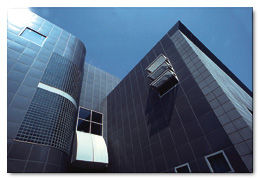Main Menu · Search · Current Issue · Contact · Archives · Centennial · Letters to the Editor · FAQs
![]()
Main Menu ·
Search · Current Issue · Contact · Archives · Centennial · Letters to the Editor · FAQs
 Werner Otto Hall, which houses the Busch-Reisinger Museum, full of art from central and northern Europe. When the $7.5-million, 14,500-square-foot building opened in 1991, it was described by an architecture critic as looking like a perfectly wrapped package. Alas, there's trouble within--excess condensation (see below).CHRISTOPHER S. JOHNSON
Werner Otto Hall, which houses the Busch-Reisinger Museum, full of art from central and northern Europe. When the $7.5-million, 14,500-square-foot building opened in 1991, it was described by an architecture critic as looking like a perfectly wrapped package. Alas, there's trouble within--excess condensation (see below).CHRISTOPHER S. JOHNSON |
$30,080 and Counting
The price of attending the College continues to climb, albeit at a diminishing rate. Undergraduate tuition, room, and board will cost $30,080 in the 1997-1998 academic year; the current charge is $28,896. The rate of increase, 4.1 percent, is the lowest since the late 1960s, and compares favorably to increases of 5.1 and 4.8 percent, respectively, in the two prior years. But the bump was enough to push the cost of a year at Harvard above $30,000 for the first time; 20 years ago, the bill was $7,000, and a decade ago it reached $17,100. Administrators cited the costs of financial aid, information technology, and library materials in announcing the increase. As in years past, undergraduate fees account for more than half of the unrestricted revenues of the Faculty of Arts and Sciences.
Funding the "Knuckle"
Haruo Naito, chief executive officer of the Tokyo-based pharmaceutical firm Eisai Company, has contributed more than $8 million to augment the facilities of the department of chemistry and chemical biology. The funds will permit construction of a building that links the Mallinckrodt and Converse laboratories--a configuration known to its designers as the "Knuckle." David Evans, the department chairman and Lawrence professor of chemistry, said the new space will make it possible to hire more faculty members, including organic, inorganic, and physical chemists. Limited teaching and laboratory space kept the department understaffed, he said.
The Ratings Game
 In its annual ranking of graduate and professional schools, U.S. News & World Report, now edited by James Fallows '70, placed Harvard Medical School at the head of the parade (just before Johns Hopkins). Also top-ranked, for architecture, was the Graduate School of Design (ahead of MIT). In business, law, and public health, the magazine ranked Harvard second (behind Stanford, Yale, and Johns Hopkins, respectively). The Graduate School of Education came in fourth in its class. But beware those Crimson engineers: when it comes to semiconductors and bridges, Harvard placed twenty-fifth.
In its annual ranking of graduate and professional schools, U.S. News & World Report, now edited by James Fallows '70, placed Harvard Medical School at the head of the parade (just before Johns Hopkins). Also top-ranked, for architecture, was the Graduate School of Design (ahead of MIT). In business, law, and public health, the magazine ranked Harvard second (behind Stanford, Yale, and Johns Hopkins, respectively). The Graduate School of Education came in fourth in its class. But beware those Crimson engineers: when it comes to semiconductors and bridges, Harvard placed twenty-fifth.
Weeping Walls
More than art hangs on the walls of Werner Otto Hall of the Busch-Reisinger Museum. Excess condensation in the building--which could damage the collections if uncorrected--has prompted the University to file suit against Gwathmey Siegel & Associates, the architect, and Walsh Brothers Inc., the builder, to preserve its rights under the statute of limitations. According to Robert B. Donin of the general counsel's office, negotiations are underway with all parties to find a solution to the "vexing problem," which involves both the structure and its climate-control systems.
Nota Bene
Pulitzer Prizes. Among those honored April 7 were Jack N. Rakove, Ph.D. '75, author of Original Meanings: Politics and Ideas in the Making of the Constitution, for history; Michael G. Gartner, IOP '94, editor of the Daily Tribune, Ames, Iowa, for editorial writing; John F. Burns, G '81, of the New York Times, for international reporting; and Eileen McNamara, Nf '88, of the Boston Globe, for commentary.
 Schauer.MARTHA STEWART
Schauer.MARTHA STEWART |
Design Redesign. GSD News, the alumni publication of the Graduate School of Design, has remade itself as Harvard Design Magazine, available by subscription and on newsstands. The inaugural issue of the thrice-yearly tabloid focuses on cities and urbanism.
First Daughter. Chelsea Clinton, who was thinking about attending Harvard, spent the weekend of April 5 and 6, sans parents, checking the place out. Saturday night she reportedly partied at the A.D., a final club.
Government Dean: Frederick Schauer, J.D. '72, Stanton professor of the First Amendment, is the new academic dean of the Kennedy School of Government. A specialist in constitutional law and free speech, Schauer succeeds David Ellwood '75, Ph.D. '81, who stepped down to focus on research on welfare and poverty.
Main Menu ·
Search · Current Issue · Contact · Archives · Centennial · Letters to the Editor · FAQs
![]()